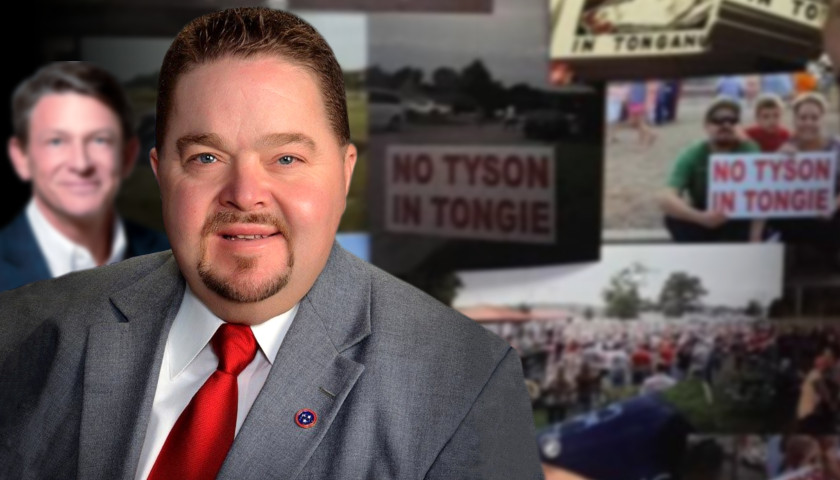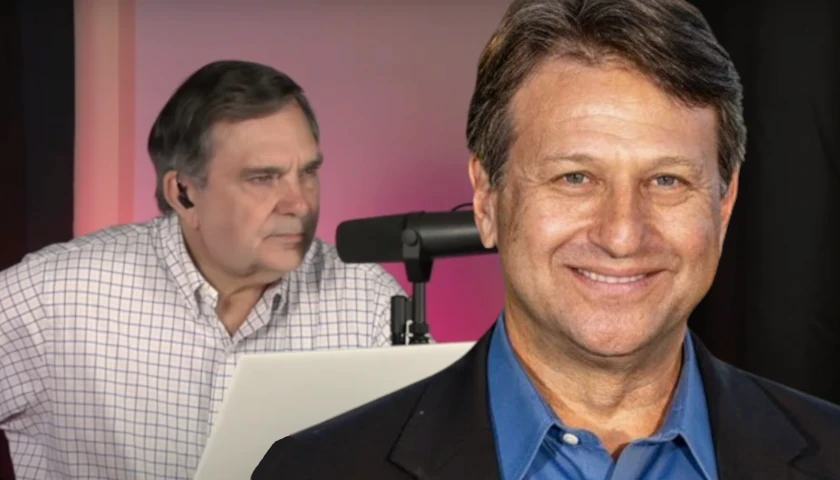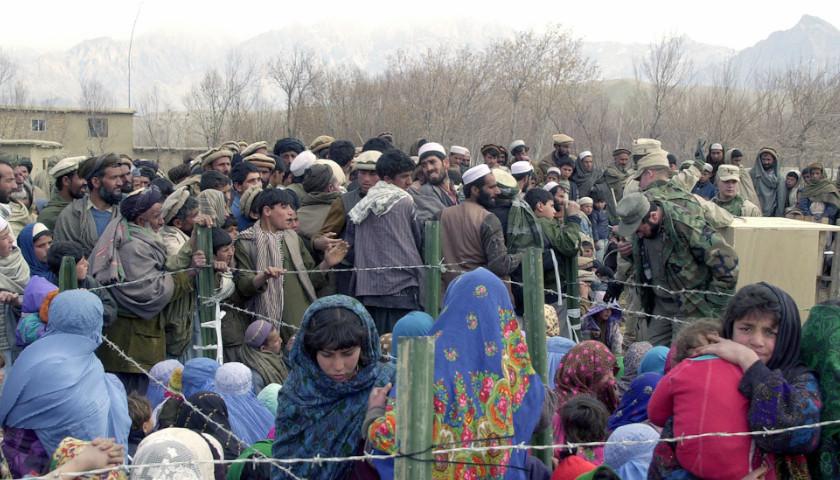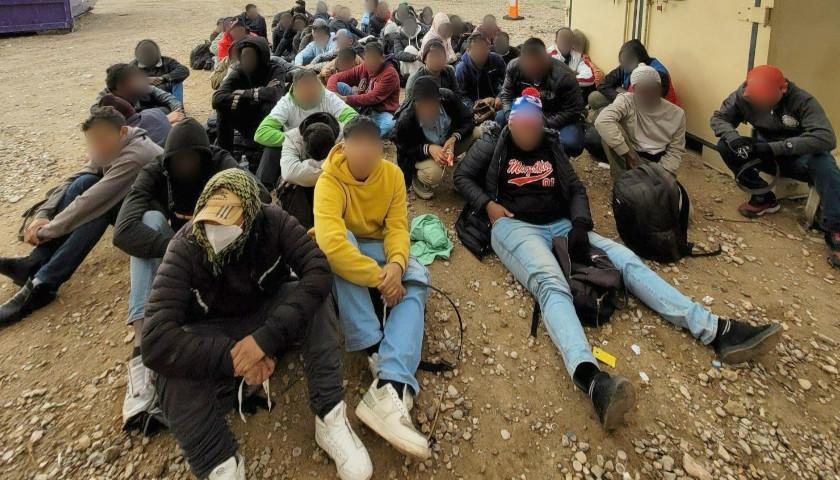The decision by Tyson Foods to open a meat-packing plant in Humboldt, Tennessee, welcomed recently by Gibson County Mayor Tom Witherspoon, came only after the facility was rejected by citizens in Tonganoxie, Kansas. The “big meat” company would have created approximately the same 1,500 jobs there that it says it will bring to rural Gibson County.
Witherspoon, elected as a Democrat in 2010 and 2014, is one of 45 county mayors who have endorsed GOP gubernatorial candidate Randy Boyd, the Knoxville businessman and former commissioner of the Tennessee Economic and Community Development Department.
Reuters reported in November 2017 that the decision by Tyson Foods to switch over to Humboldt came only after “the No Tyson in Tongie” citizen-led opposition defeated a proposed Tyson plant in Tonganoxie, Kansas, a town not much smaller than Humboldt. Several Kansas state legislators also committed to opposing the proposed Tyson plant.

Citizen opposition in the “Tongie” area was described as “staggering,” Twilight Greenaway reported at Moyers & Company, the website operated by far left journalist Bill Moyers.
That opposition was fueled in part by the secrecy in which the deal was arranged between Tyson executives and local officials until it was finally made public in September, Greenaway reported:
The Tyson plant was also a long-kept secret with the code name Project Sunset. Local lawmakers were asked to sign nondisclosure agreements when considering welcoming it to town, and the company is said to have worked through intermediaries when negotiating with the landowner over the 300-acre lot it would occupy.
But once the deal was done and the plan was made public, word traveled fast, and residents of the town started a group called Citizens Against Project Sunset (CAPS) and threw up a “No Tyson in Tongie” Facebook group that swelled to over 5,000 members. By last Friday, 2,500 people had gathered in a city park to oppose the development.
Then, on Monday, the Leavenworth County commissioners had rescinded its offer to pledge $500 million in revenue bonds for the facility. The next day, Tyson sent a letter to the county announcing that it had put the plans for the plant on hold.
Greenaway’s accounting of the “No Tyson in Tongie” defeat of Tyson Foods acknowledged that the issue of “new comers” arriving for meat-packing jobs also concerned residents. Greenaway notes that “most meat processing plants are now staffed almost entirely by immigrant and refugee populations from places like Somalia, Latin America and South Asia.”
The Tennessee Star asked Center for Immigration Studies fellow Don Barnett, the longest-running and most prolific researcher and writer in the U.S. about the refugee resettlement program whose work has been cited in the Wall Street Journal, National Review, the Christian Science Monitor and Newsday, among others, “[h]ave you observed what, if any, influence jobs such as meat-packing have on the placement of refugees? Have you documented any demographic shifts/impacts in towns that have meat-packing plants?”
Barnett’s answer is consistent with the experience of towns, particularly small rural towns across the country:
Industrial scale meat packing plants always bring demographic changes to towns where they set up shop. It is very clear that, once illegal immigrant labor became less available, meat packers turned to refugee resettlement contractors to provide cheap, non-union labor.
Regarding the arrival of Somali refugees in Shelbyville, Tennessee to work at the Tyson plant there, Barnett referenced “news reports” that “the refugees were driven to Shelbyville from resettlement cities like Nashville by the refugee agencies. Later, some moved into apartments in Shelbyville, having first been resettled in other areas of the state.”
Tracking the refugee resettlement program in Tennessee, Barnett notes that after then governor Phil Bredesen withdrew the state from the refugee resettlement program, the U.S. Office of Refugee Resettlement designated Catholic Charities of Tennessee to continue bringing refugees to the state, and that as a consequence:
The numbers resettled in the state immediately went up by more than 70% and stayed higher even as the national quota drifted down. Also, there was less cooperation with legislators over answering questions about use of state and federal welfare services by refugees. The contractor would not even divulge the number of refugees that they planned to resettle in the state.
The contractor took over the role of state refugee coordinator. The role of the state refugee coordinator was supposed to be an employee of the state of Tennessee. Having the contractor in the position of oversight of the contractor’s activities is an obvious conflict of interest.
Citizen opposition to the Tyson plant in Tongie, Kansas, also focused on Tyson’s questionable history of environmental violations:
In April 2013, Tyson agreed to pay the federal government $3.95 million for violations of the Clean Air Act in Kansas, Missouri, Nebraska and Iowa — the four states that comprise Region 7 of the Environmental Protection Agency.
The violations involved eight different leaks of anhydrous ammonia, a poisonous gas. In 2006, a Tyson worker was killed as a result of one such leak in South Hutchinson, Kan. A similar leak in a Tyson plant in Omaha forced the evacuation of 475 employees.
There’s more. In 2003, Tyson pleaded guilty in federal court to 20 felony violations of the Clean Water Act. The company admitted it illegally disposed of wastewater at its Sedalia, Mo., plant over several years.
The improper disposal continued “in spite of the company’s assurances that the discharges would stop and even after numerous warnings, administrative orders, two state court injunctions, and the execution of a federal search warrant at the Sedalia facility,” the Department of Justice said.
Tyson paid a $7.5 million fine in that case. Ancient history? No. “The company has a staggering water pollution footprint,” the Environment America Research and Policy Center concluded just last year.
‘We got notified a day in advance that 70 Somalis were being transferred from a (Tyson Foods) plant in Nebraska,’ Hively recalled. ‘That 70 soon grew into 400, seemingly overnight.’
‘We literally had droves in our waiting room, waiting to see a public health official,’ Torres said.
Torres is the case manager for about 160 Somalis in Emporia who have been diagnosed with latent tuberculosis…
Latent TB, if untreated, can become active TB.
Just two years ago, the Wichita, Kansas school district appealed to the state for an additional $1 million dollars in extraordinary funding to meet the needs of the increased refugee student population.
More recently in October 2017, Kansas citizens organized against and defeated a proposed Tyson Foods plant to be located in Sedgwick County where Wichita is located.
Red flags thrown up by Kansas citizens and confirmation based on the experience of other small towns of the changes brought by the arrival of “big meat,” means that changes, while unknown at this time and at whatever cost, are headed to Humboldt, Tennessee with the arrival of Tyson Foods.






[…] newly planned Tyson Foods plant in Humboldt. The Tennessee Star has previously reported on the employment of refugees in Tyson Foods meat processing facilities. A supplemental appropriation of $18 million dollars for […]
[…] that only positive impacts will result from the arrival of the Tyson Foods chicken plant, first rejected in Tonganoxie, Kansas, but now being relocated to Humboldt, […]
Humboldt could possibly endure water and air problems which effect the whole area, more disease which is a drain on their health care facilities, a strain on educational system as the average number of children per Somali is at least 5, and an increase in police and fire costs since crime and fires seem to follow the Somalis where ever they go. And last but not least, don’t forget the cultural enrichment they bring with Female Genital Mutilation, polygamy and extreme prejudice against females and non-Muslims.
So what good to a small town is any Tyson meat packing plant that hires refugees instead of local citizens? For Tyson, it’s all about the $$. What good is there in this deal for Mayor Tom Witherspoon?
[…] but this is fascinating news. And, it is so exciting to see investigative reporting at its finest! Tennessee Star: The decision by Tyson Foods to open a meat-packing plant in Humboldt, Tennessee, welcomed recently […]
That city cannot afford this as there is not one who speaks Somalia to interpret for the schools or have a police force strong enough to protect the women from murder or rape as in Minnesota. This is rediculous and Tyson should locate in A town where Corker or Haslem live and they should pay the cost to have them as both are billionaires. These men should give the kickback from Tyson to the town. People in this small town should organize as Kansas did “too too expensive for taxpayers. Double or triple the tax Tyson pays to the city otherwise you cannot afford them.
Good for the Kansans. Saving their local American culture was more important to them then having a big plant. Tyson is well known for catering to immigrants that do not integrate and demand concessions about their Islamic beliefs. Too bad Tennessee doe not have the same values as the folks in Kansas.
[…] Tennessee Star: […]